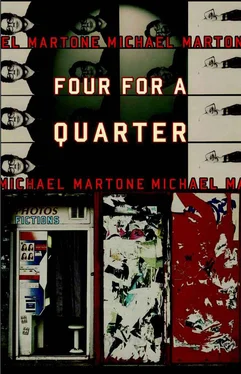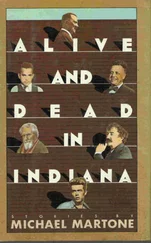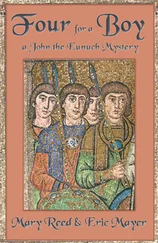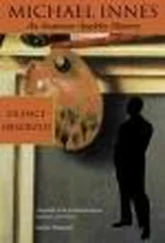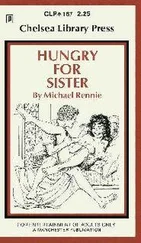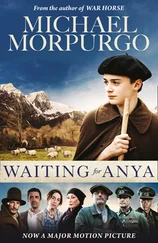Michael Martone - Four for a Quarter - Fictions
Здесь есть возможность читать онлайн «Michael Martone - Four for a Quarter - Fictions» весь текст электронной книги совершенно бесплатно (целиком полную версию без сокращений). В некоторых случаях можно слушать аудио, скачать через торрент в формате fb2 и присутствует краткое содержание. Год выпуска: 2011, Издательство: Fiction Collective 2, Жанр: Современная проза, на английском языке. Описание произведения, (предисловие) а так же отзывы посетителей доступны на портале библиотеки ЛибКат.
- Название:Four for a Quarter: Fictions
- Автор:
- Издательство:Fiction Collective 2
- Жанр:
- Год:2011
- ISBN:нет данных
- Рейтинг книги:3 / 5. Голосов: 1
-
Избранное:Добавить в избранное
- Отзывы:
-
Ваша оценка:
- 60
- 1
- 2
- 3
- 4
- 5
Four for a Quarter: Fictions: краткое содержание, описание и аннотация
Предлагаем к чтению аннотацию, описание, краткое содержание или предисловие (зависит от того, что написал сам автор книги «Four for a Quarter: Fictions»). Если вы не нашли необходимую информацию о книге — напишите в комментариях, мы постараемся отыскать её.
. In subject — four fifth Beatles, four tie knots, four retellings of the first Xerox, even the sex lives of the Fantastic Four — and in structure — the book is separated into four sections, with each section further divided into four chapterettes—
returns again and again to its originating number, making chaos comprehensible and mystery out of the most ordinary.
Four for a Quarter: Fictions — читать онлайн бесплатно полную книгу (весь текст) целиком
Ниже представлен текст книги, разбитый по страницам. Система сохранения места последней прочитанной страницы, позволяет с удобством читать онлайн бесплатно книгу «Four for a Quarter: Fictions», без необходимости каждый раз заново искать на чём Вы остановились. Поставьте закладку, и сможете в любой момент перейти на страницу, на которой закончили чтение.
Интервал:
Закладка:
He eats. He eats, I think, without thinking, mouth open, exhausted. He sweats inside the cow and, inside the car, the car fills up with the sweet sweat smells and the smell of the sweated onions, the rancid grease, the reeking suit. It is close inside the car, and it is getting closer still. He eats without talking. He eats in silence, a silence only punctuated by the sound of his chewing, chewing. He eats. The empty head in the backseat, I catch its look in the rearview mirror, the big soulful eyes staring back at me into space.
Four Postcards from Indiana
STORY
On the way to Story, Indiana, 315 T'ed into an unnamed road, and, at the junction, the side of a yolk yellow farmhouse stared back at me with four identical windows on the fading façade, each window divided into four picture panes of glass. The green information sign indicated that Story was five miles thataway with an arrow pointing to the right. A white picket fence separated the sign and the road from the house, and, dead ahead, fenced in its own little precinct of half-sized pickets, some kind of monument caught the light already filtered by the gobo clusters of leaves in the copse of tulip poplars in the yard. I parked the car.
Crossing the road, I saw the plinth of stone transform as I got closer, watched as it sprouted shoulders, then grew a head, busting out into a rustic bust, its face pancaked, its contours — the lips, eyes, and eyebrows — charred black. A black widow— peaked helmet of hair. Matte muttonchop shadows burned each cheek. A coy naive sphinx. The stone head's etched left eyebrow arched, waiting for the question already answered. Tattooed on its roughed-out apron of a chest, a hand pointed left to Columbus and another hand right to Fairfax, a town no longer on the map. Take your pick.
“What's your story?“ I asked it.
The cicada brood bloomed and buzzed in the trees. Cardinals chewed out each other, flitted overhead. There, below the folded hands, not much of a clue — a year, 1851, and a diminutive signature of H Cross , its second “s“ washed out as the sandstone melted into the seam at the base. At that angle, the stone head turned into the Hoosier Mona Lisa, the crisscrossed hands, the unselfconscious conscious smile, the eyes half- lidded, backlit by a painted landscape more animated than the foiled subject.
I looked back at the car. I'd left its hazard lamps blinking, the indicator lights signaling that both ways were a possibility simultaneously or that each canceled the other out.
In the end, I turned away from Story, bore the other route toward Columbus — the town filled with autographed churches and fire stations, those modern slabs of steel and glass that just so happened to find themselves planted in what had been an Indiana cornfield. And where I found, in an ordinary gas station, a postcard picturing the corner I left behind — the yellow house, the picket fence, the knob of stone with its unreadable and unreachable directions, and the sign pointing to Story that I sent to you asking one last time: Who should we tell? What should we do? Where should we go? Why?
SANTA CLAUS
“A watch means that conditions are right for a tornado.“ As we drove, I explained the difference between a watch and a warning. This was her first summer in Indiana, and every time she turned on the radio she found herself in another depression, pressure dropping. An imaginary line extending just north of and passing through the counties of La la la and Mmmmm. The Balkan states of the weather map. It would be in effect for a couple of hours.
“Is that us?“ she said.
“It's just a watch,“ I said, and I told her what to look for, though I had never seen one myself. I remembered sightings, hearing of funnels over towns. One Easter. One Palm Sunday. “If you see one, we get in a ditch. Someplace low.“ I remembered feeling this way every spring and summer — too hot, too still. You can hear better. There was this picture in the grocery store encyclopedia of a drinking straw driven into the trunk of an elm. She had seen violent storms in Baltimore but only the leavings of hurricanes, not this kind of wind — all eye and finger, one that can see and feel.
Of course, it started raining, and the voice on the radio tracked the storms, interrupted by the sizzle of static — soft or loud, close or far away. I'm here now, the static said. Teasing. Moving.
“It's not us,“ I said.
In the half-light we passed the statue of Santa Claus, melted limestone, in a field surrounded by broken skeletons of farm implements slick with rain and submerged in mud. Horses, startled by the lightning, shied and ran sideways away from the sound. The book said the statue said: For the Children of the World.
Triple A just mentioned the St. Nicholas Inn, the only motel in Santa Claus. It was made up of little bungalows, Munchkin-size, scattered behind a gas station.
“A mite windy,“ said the woman, letting us into number 4. The baby riding on her hip yelped each time it thundered. “No one stays here. They drive up from Louisville or down from Naplis to see Santa Claus. My baby sees him every day.“
We went into our room and found everything half-sized — the TV, the end table, the bed. “Think,“ she said, “to grow up seeing Santa Claus every day but Christmas.“ Yes, in the part of the world where flying is easy — lawn deer, flamingoes, silked jockeys.
As we slept did we shrink? Were we that small? Did our feet touch the ground? Did we count each other's sheep as they clouded that tiny room? We heard the baby cry all night through the storm.
The next morning I knew the sky was clear before she pulled the drapes and turned on the morning news. Eyes still closed, I heard that a tornado had touched down in the Baltimore zoo the day before. A woman reported that she survived by being blown into the hippo house. A miracle. The world is full of miracles. Closing my eyes again, I see the woman blown into the hippo house. One puff, a blow to the belly, arms and legs trailing, millions of shrimp swimming backwards into the hippo house. Size has no scale. I am asleep again.
Later we wrote our postcards in the car, parked next to the post office. The doors were open. To keep the post office, the natives changed the name of their town from Santa Fe to Santa Claus. Now, besides the amusement park, the post office is the town's only industry. All the letters come here. All the ones addressed to the North Pole. All the lists. All the directions home. We came here to mail some from the eye of the storm. All the stamps were airmail. It is too hot for Christmas, too still. You could hear the sleigh bells.
“Look. Look,“ I said, pointing across the evaporating parking lot to the back gate of Santa Claus Land, “Santa Claus.“ In shirtsleeves and Bermudas, he swung a black lunchbox as he went to work. He was sweating and he wasn't whistling. She didn't look up.
“Where?“ she said.
But he was already gone through the gate and hidden behind the scraps of newspaper caught in the Cyclone fence. I pointed with my finger.
“There.“
FRENCH LICK
We came into the valley from Santa Claus and skirted the grand hotel fronting the road, a walled city. We crossed the old Monon tracks, the spur where the private cars from Chicago were switched right up to the door of the resort. “Monon,“ you said. I told you again about Hoosier, who's there. The French in Indiana. We stayed down the road in a motel — half in French Lick, half in West Baden. Alsace-Lorraine. “A lick,“ I said, “was for the wild game. The seasoning in the ground.“ I showed you the salt blocks in the supermarket.
“Kiss me, there,“ you said.
We walked back over to the grand hotel. In the coffee shop you had a tongue sandwich, and the waitress behind the counter said I was the first to order a bagel and cream cheese “since I've worked here. What do I do?“ Next to us on the little stools, a couple argued about the food. She complained about her peas in French. He scolded her in English. We came for the waters, you said. But really you only wanted your postcards canceled with French Lick. We played Space Invaders in the arcade, and they kept coming. Then we lingered on the veranda, following the deck chairs to the spring. The spring was in a gazebo, bubbling through a pool of green water. “Kiss me, here,“ you said, but the sulfur smell was too strong. “If nature can't Pluto will.“ You read the sign. “This is what they came for?“ you said. “This is what they came for, the presidents and gangsters?“
Читать дальшеИнтервал:
Закладка:
Похожие книги на «Four for a Quarter: Fictions»
Представляем Вашему вниманию похожие книги на «Four for a Quarter: Fictions» списком для выбора. Мы отобрали схожую по названию и смыслу литературу в надежде предоставить читателям больше вариантов отыскать новые, интересные, ещё непрочитанные произведения.
Обсуждение, отзывы о книге «Four for a Quarter: Fictions» и просто собственные мнения читателей. Оставьте ваши комментарии, напишите, что Вы думаете о произведении, его смысле или главных героях. Укажите что конкретно понравилось, а что нет, и почему Вы так считаете.
